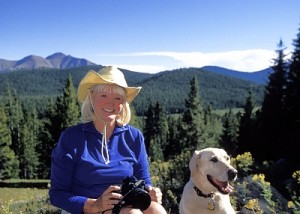Sidebar by Ed Quillen
Agriculture – June 2005 – Colorado Central Magazine
When it comes to biofuels, you could start with firewood – it can be locally grown, it’s renewable, and it can cook your dinner and keep you warm. But most current talk of biofuels focuses on blending a liquid fuel made from farm crops with a liquid fuel made from petroleum distillates.
For instance, people have been making alcohol from plants for a long time. And it’s possible to run an internal combustion engine, similar to a car’s gasoline engine, with pure ethanol (a/k/a straight grain alcohol, ethanol, or C2H5OH). They’ve been doing that in Brazil for nearly 30 years.
But the combustion characteristics of alcohol are so different from gasoline’s that the engine has to be modified to burn pure alcohol. Put together a mixture of 10% alcohol and 90% gasoline, however, and you save some petroleum without having to modify the engine. That’s “gasohol.”
“Biodiesel” is a similar concept. It involves a mix of 80% diesel fuel with 20% fuel from an oil crop like sunflowers, soybeans, or canola (a variety of rapeseed that can be grown in the San Luis Valley).
It burns like regular diesel fuel and does not require engine modifications, according to Jeff Probst, president of Blue Sun Biodiesel, which is based in Fort Collins and operates in Colorado and New Mexico.
Blue Sun recently opened a terminal and processing plant in Alamosa. It will buy canola seed from Valley farmers, process it to extract the oil (about 40% by weight), and ship by tanker truck or railroad tank car.
Straight vegetable oil (with additives to discourage bacteria and encourage clean fuel filters) is called “B100.” When it’s blended 20-80 with diesel fuel, it’s “B20.”
It’s obvious that Probst believes in Blue Sun Diesel. “It costs a few cents more a gallon, but you save that in increased power, better mileage, and reduced maintenance costs – for instance, you can go longer between oil changes.”
Further, “the money stays in Colorado. It goes to our Colorado company and to Colorado farmers. It doesn’t go to Iraq.”
Blue Sun plans to be selling at the pump in Alamosa by the end of May, and within a month or two, in Salida. It’s already available in Pueblo, Durango, and Colorado Springs, among other places.

